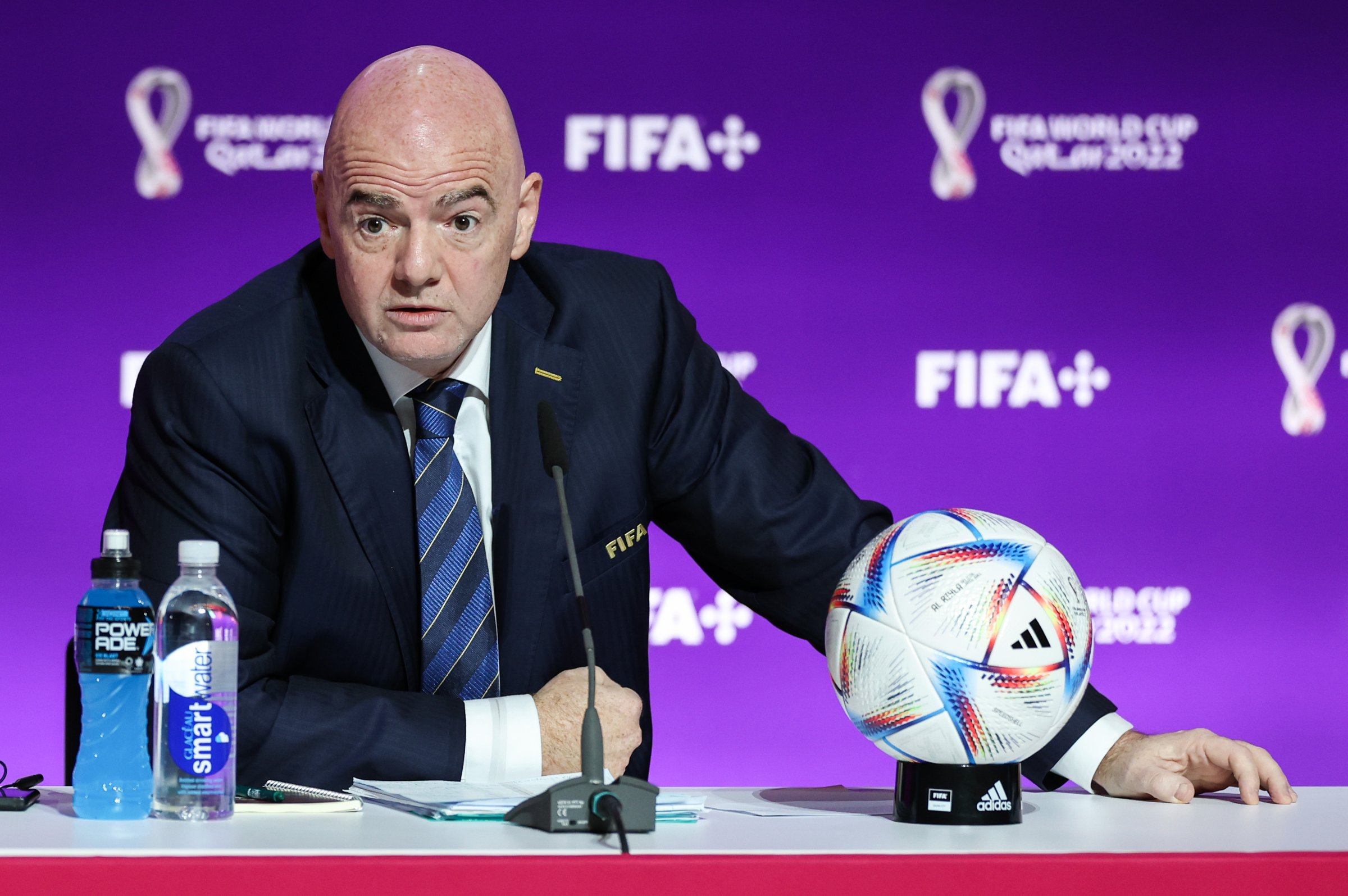
On the eve of signature sporting events, athletic administrators often address the media, as a sort of “state-of-the-union” affair to address a league’s accomplishments and concerns. Before the Super Bowl and NBA Finals, for example, commissioners of the NFL and NBA speak to the press, take some questions from reporters, and either offer direct answers or spin as they see fit. It’s an almost ceremonial exercise.
The goal: mollify the media before everyone moves onto the big games.
On Saturday in Doha, FIFA president Gianni Infantino offered a new twist on this ritual. Instead of ushering in the Qatar World Cup, which begins on Sunday, Infantino gave an extraordinary speech, full of grievances about media examinations of the host country’s human rights record, whataboutism, and what can best be described as an awkward attempt to compare his personal backstory to disenfranchised populations across the globe. (At worst, his remarks were highly offensive).
Infantino badly conflated examination with provocation. CNN labeled the speech an “explosive tirade.” If anything, the immediate negative response to Infantino’s press conference shined further light on the problems surrounding this 2022 World Cup, and undercut his own plea to keep the focus on football, to stick to sports.
Infantino scored a spectacular own-goal for his own World Cup.
Near the beginning of his sprawling hour-long address, Infantino said, “Today I feel Qatari. Today I feel Arabic. Today I feel African. Today I feel gay. Today I feel disabled. Today I feel (like) a migrant worker.
“Of course I am not Qatari, I am not an Arab, I am not African, I am not gay, I am not disabled. But I feel like it, because I know what it means to be discriminated, to be bullied, as a foreigner in a foreign country. As a child I was bullied – because I had red hair and freckles, plus I was Italian so imagine.”
Infantino grew up in Switzerland. He said he feels like a migrant worker. Infantino made a $3.2 million in 2019.
“What do you do then?” Infantino said. “You try to engage, make friends. Don’t start accusing, fighting, insulting, you start engaging. And this is what we should be doing.”
(READ MORE: Meet The 22-Year-Old Star Who Could Make Team USA A World Cup Contender)
Summoning the familiar whatabout deflection to which we’ve become all too accustomed in political discourse, Infantino suggested that Western countries were in no position to criticize Qatar, given the human rights shortcomings in Europe and elsewhere.
“We have told many, many lessons from some Europeans, from the western world,” Infantino said. “I think for what we Europeans have been doing the last 3,000 years we should be apologizing for next 3,000 years before starting to give moral lessons to people.”
True, every nation is far from perfect. But Infantino seemed to forget that he leads an organization that was embroiled in a bribery scandal when it awarded the World Cup to Qatar in 2010. (Though Infantino was not head of FIFA at the time). That thousands of migrant workers have died in Qatar over the past decade, many because of poor working conditions made more perilous by excessive heat. That FIFA made a conscious decision to hold a World Cup in Qatar. Questions are more than fair game. For Infantino to suggest criticism of Qatar is “just hypocrisy” could not be more hypocritical.
Infantino also looked to the disabled population to make his case for media hypocrisy. “I was at an event a few days ago when we explained what we’re doing at this World Cup for disabled people,” Infantino said. He noted that there were around 400 journalists at his press conference on Saturday, but just four at that event. ‘There [are] one billion disabled people in the world,” he said. “One billion disabled people. Nobody cares.”
Infantino summoned some self-pity for FIFA, an organization that has earned none. “It’s not easy, everyday and everyday to read all these critics,” he said. He also lectured the press on how they should do their job going forward. “If you need to criticize somebody, don’t criticize the players,” Infantino said. “Don’t put pressure on the players, don’t put pressure on the coaches. Let them concentrate on making their fans happy.”
His words were met with swift condemnation. Nicholas McGeehan, director of FairSquare, a non-profit human rights organization, called Infantino’s speech “crass.” “In brushing aside legitimate human rights criticisms, Gianni Infantino is dismissing the enormous price paid by migrant workers to make his flagship tournament possible – as well as FIFA’s responsibility for it,” Steve Cockburn, Amnesty International’s Head of Economic and Social Justice, said in a statement. “Demands for equality, dignity and compensation cannot be treated as some sort of culture war – they are universal human rights that FIFA has committed to respect in its own statutes.”
Infantino did announce that FIFA would start a legacy fund to follow this World Cup. “This cannot be mere window dressing, however,” said Cockburn. “If FIFA is to salvage anything from this tournament, it must announce that it will invest a significant part of the $6 billion the organization will make from this tournament and make sure this fund is used to compensate workers and their families directly.”
Let’s hope Infantino’s actions after the World Cup rank better than his performance before it.
(READ MORE: Your Complete Guide To The US National Team At The 2022 World Cup In Qatar)
More Must-Reads from TIME
- Cybersecurity Experts Are Sounding the Alarm on DOGE
- Meet the 2025 Women of the Year
- The Harsh Truth About Disability Inclusion
- Why Do More Young Adults Have Cancer?
- Colman Domingo Leads With Radical Love
- How to Get Better at Doing Things Alone
- Michelle Zauner Stares Down the Darkness
Write to Sean Gregory at sean.gregory@time.com